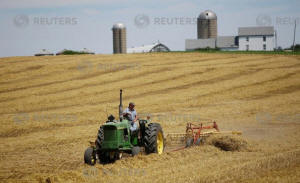|
Exclusive: White House delays new farm
aid payments on China trade hopes - sources
 Send a link to a friend
Send a link to a friend
 [December 12, 2018]
By Humeyra Pamuk and Jarrett Renshaw [December 12, 2018]
By Humeyra Pamuk and Jarrett Renshaw
WASHINGTON/NEW YORK (Reuters) - The White
House is delaying additional payments from a $12 billion aid package for
farmers stung by President Donald Trump's trade war with China because
it expects Beijing to resume buying U.S. soybeans, three sources
familiar with the matter told Reuters.
The move comes despite a lack of evidence in agricultural markets of any
return by China to the U.S. soy market. China last year purchased about
60 percent of U.S. soybean exports, but it has not inked any new soybean
deals since Beijing imposed tariffs on U.S. supplies in July.
Trump told Reuters in an interview late on Tuesday that discussions to
resolve U.S. trade disputes with Beijing were taking place by telephone,
and that China was "just starting" to buy "tremendous amounts" of U.S.
soybeans.
The Office of Management and Budget at the White House is now holding up
approval of the second and final tranche of aid payments Trump had
promised farmers stung by the trade disputes due to concern over the
cost of the program, and because it wants to see if the trade issues
with China are resolved, the three sources told Reuters.
The sources asked not to be named because the matter had not yet been
made public.
"It has been no secret that OMB has not been terribly excited about the
trade aid package," one of the sources said. The source added, however,
that the payments will likely eventually be approved after some "back
and forth."
The U.S. Department of Agriculture in July had authorized up to $12
billion in aid for farmers and ranchers hit by the fallout from Trump's
escalating trade war with China and the agency outlined payments for the
first half last August.
An announcement on the second tranche had been expected in early
December. Agriculture Secretary Sonny Perdue said on Dec. 3 that OMB was
deliberating on the second round of trade aid, and that it could be
outlined by the end of that week.
On Tuesday, USDA spokesman Tim Murtaugh told Reuters that the agency was
still in the "final stages" of the process of approving the second
tranche of payments.
"We are in discussions with the White House and anticipate that the
second payment rates for the Market Facilitation Program will be
published before the end of the year," Murtaugh said in a statement.
The Office of Management and Budget declined to comment.
CHINA COMEBACK?
The sources said the White House was delaying its approval mainly on
hopes China will soon resume purchases of soybeans, which has raised
questions over how much aid farmers will need.
[to top of second column]
|

A farmer harvests his field at his farm in Pecatonica, Illinois,
U.S., July 25, 2018. REUTERS/Joshua Lott

China had imposed a 25 percent tariff on American soybeans in July
in retaliation for U.S. tariffs on Chinese goods.
Perdue said last week China will probably resume buying American
soybeans around Jan. 1, after talks between Trump and Chinese
President Xi Jinping during the G20 meeting about a potential trade
ceasefire.
However, little concrete evidence has emerged of a purchase looming
and farmers have been on edge.
Chicago Board of Trade soybean futures edged higher on Tuesday on
hopes that new deals would be inked soon, but there were no signs of
increased activity in the cash markets.
U.S. Agriculture Department rules require exporters to promptly
report sales of 100,000 tonnes or more of a commodity made in a
single day.

John Heisdorffer, the chairman of the American Soybean Association
and a farmer in Iowa, said he feared the government was going to
reduce the size of the aid payments to farmers on misplaced beliefs
the trade pain was ending.
"There are a lot of farmers that sold beans out of the field and
that is done," Heisdorffer said. "They need to get the extra
(support) to make sure that they're taken care of."
(Additional reporting by Chris Prentice and Tom Polansek in Chicago,
writing by Chris Prentice; editing by Richard Valdmanis, Chizu
Nomiyama, Jonathan Oatis and Lisa Shumaker)
[© 2018 Thomson Reuters. All rights
reserved.]
Copyright 2018 Reuters. All rights reserved. This material may not be published,
broadcast, rewritten or redistributed.
Thompson Reuters is solely responsible for this content. |